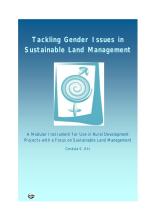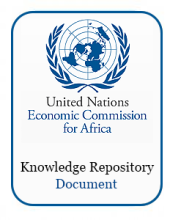/ library resources
Showing items 1 through 9 of 67.This research report examines three questions that are central to IFPRI research: How do property-rights institutions affect efficiency and equity? How are resources allocated within households? Why does this matter from a policy perspective?
This toolkit provides a framework for main-streaming gender in rural development activities.It addresses the lack of conceptual and practical tools in the area of sustainable land management.
Overview of the relationship between gender, poverty and water. The first section explores how, in every corner of the globe, women play a central role in managing water supply and distribution.
The Kumasi peri-urban area is characterised by high rates of conversion of agricultural land to private housing. Kumasi, Ghana, is also situated across a major drainage divide, resulting in a range of water quality and supply problems.
The purpose of this guide is to provide support to those who are assessing and designing appropriate responses to food insecurity and rural development situations. This guide aims to show where and why land tenure is an important issue in food security and sustainable rural livelihoods.
The study was conducted to determine whether the gender difference in wealth and land allocation between male and female farmers in male-headed households is manifested in soil fertility indicators.
This toolkit provides a framework for main-streaming gender in rural development activities.It addresses the lack of conceptual and practical tools in the area of sustainable land management.
Pagination
Land Library Search
Through our robust search engine, you can search for any item of the over 73,000 highly curated resources in the Land Library.
If you would like to find an overview of what is possible, feel free to peruse the Search Guide.




